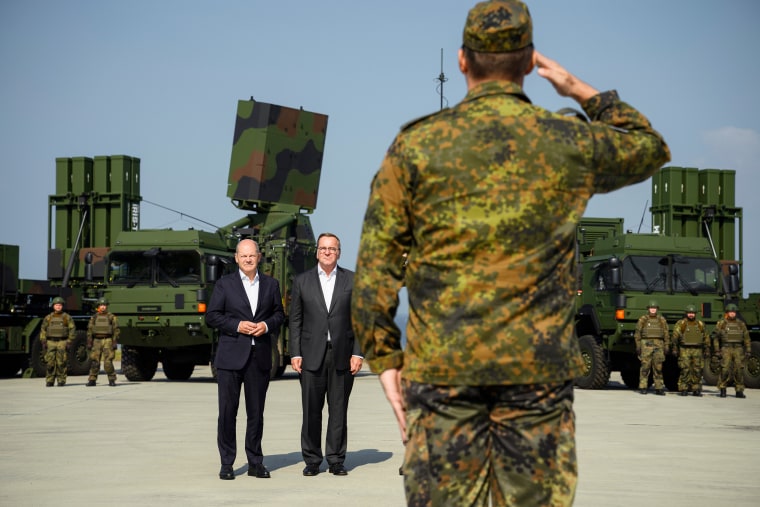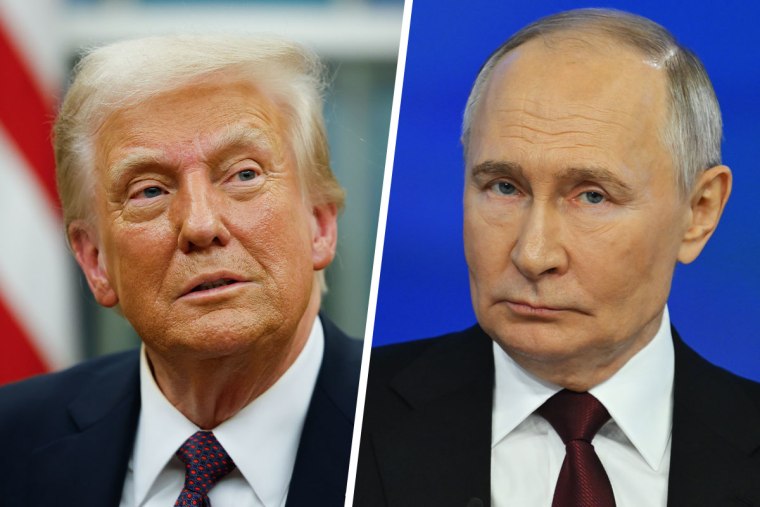The past week has left America’s European allies reeling and searching for alternatives after the Trump administration seemingly set itself in opposition to a rules-based system that the U.S. and its trans-Atlantic friends have spent decades building together.
Not only did Vice President JD Vance wade into European politics, lambasting its leadership and interfering in Germany’s upcoming election on behalf of its far right, but Defense Secretary Pete Hegseth all but nullified American military support for Ukraine, and President Donald Trump flirted with unilateral peace talks with his Russian counterpart, Vladimir Putin.
While the U.S., as the West’s superpower, and most of Europe — the European Union is an economic market of 500 million people — have spent the period since the end of World War II in political, military and commercial sync, the continent stands at the precipice of a generational change.
Europe’s leaders “cannot accept the fact that what was the U.S. is not the U.S. anymore,” and that the continent could no longer call it an ally, former French Prime Minister Dominique de Villepin said in a briefing with reporters.
“In the weeks and months, you will see the people of Europe waving their hand and asking from their government a very strong government,” said de Villepin, who served under French President Jacques chirac in the 2000s.
With a blistering attack on Europe’s culture, commitment to democracy, migration policies and the “danger from within,” Vance’s speech at the Munich Security conference — which was supposed to focus on the war in Ukraine — tore up Washington’s decadeslong alliances.
Vance’s silence on the almost three-year war also sent a clear message to Kyiv, according to Ukraine’s President Volodymyr Zelenskyy. “Decades of the old relationship between Europe and America are ending,” he told the conference in Munich. “From now on, things will be different, and Europe needs to adjust to that.”
Vance’s dismissal of Ukraine spoke to the broader view that the U.S. no longer considers European involvement in negotiations with Russia as vital to peace talks.
The Kremlin framed a recent phone call between Putin and Trump as a shift toward peace talks between Russia and the United States. Meanwhile, Secretary of State Marco Rubio is set to travel to Saudi Arabia to initiate peace negotiations, two sources familiar with the matter told NBc News.
Zelenskyy, still excluded from discussions in Saudi Arabia as of late Saturday, has been left sidelined, and European leaders shared the Ukrainian president’s unease.
After years of disunity and dithering, the leaders of the E.U. and the U.K. are worried they no longer have a seat at the table in negotiations that may reshape their ally’s borders, and are set to gather in Paris this week for a summit on the war, in response to concerns the U.S. is moving ahead without them.
“Europe urgently needs its own plan of action concerning Ukraine, Polish Prime Minister Donald Tusk said Saturday. “Or else other global players will decide about our future. Not necessarily in line with our own interests.”

Still, Ukraine is the tip of the iceberg when it comes to the faltering rapport between Europe and the U.S. over policy and ideology. At the heart of Vance’s speech was a direct attack on European democracy and culture.
The vice president told the conference that he was worried less about the threats of Russia or china and more about “the retreat of Europe from some of its most fundamental values, values shared with the United States of America.”
Director of National Intelligence Tulsi Gabbard took a different approach, somewhat muddying the waters in Munich by saying challenges from “Russia, china, Iran and North Korea demand a united front.”
But analysts say Trumpist foreign policy — involving stopping almost all funding for the U.S. Agency for International Development and seeking to shake off Kyiv — may create an opportunity for America’s rivals.
china’s foreign ministry responded on Saturday to events in Munich, saying it wants to “strengthen solidarity” and “practice multilateralism” with Germany and the European Union in what can only be read as thinly veiled comment on the Trump administration’s capriciousness.
Europe’s leaders can expect more of the same, said Keir Giles, a senior fellow at the London-based chatham House think tank.
“It would be astonishing if not just china, but other adversaries of Europe were not to take advantage of the split and the gaps this presents,” Giles told NBc News.
Meanwhile, Vance’s criticism of European leaders for shunning far-right parties was taken as an endorsement of those parties, which are on the rise in Europe, especially in the context of his later meeting with Alice Weidel, co-leader of Germany’s far-right Alternative for Germany (AfD) party.

The AfD is poised to play kingmaker in any coalition emerging from elections in Germany next week. There has long been a taboo against allying with the party, which has won the support of key Trump adviser Elon Musk.
The normally mild-mannered German chancellor Olaf Scholz accused Vance of interfering in Germany’s elections. “That is not appropriate, especially not among friends and allies. We firmly reject that,” he told the conference.
Perhaps even more striking, Germany’s conservative opposition leader Friedrich Merz felt the need to publicly state that he expected the U.S. to respect the results of the upcoming elections.
Even so, Europe’s leaders had few reasons to be surprised despite Vance’s ferocious attack, according to chatham House’s Giles.
Giles told NBc News that Europe has ignored decades of signals that U.S. patience has been “wearing thin” with Europe’s reliance on American defense and that Vance’s rhetoric on immigration and his outreach to the far right would resonate with European voters.
Both Vance and Hegseth this week echoed Trump’s long-standing view that Europe should contribute more toward its own defense.
In the latest consequence of that policy, U.K. Prime Minister Keir Starmer was preparing to raise his country’s defense spending ahead of a visit to meet Trump, Britain’s Sunday Times newspaper reported.
Starmer will hope to win favor in Washington with the funding boost when he visits at a crucial time for both the Ukraine talks and the political balance of its E.U. neighbors.
Next week, Germany goes to the polls in an election in which the AfD is expected to perform well. It may be the first test for the shifts that Vance described in Munich.
The schism “is not invented out of thin air,” Giles said. “There’s a reason populist parties across the continent tap into a deep vein of frustration with Europe’s elites.”